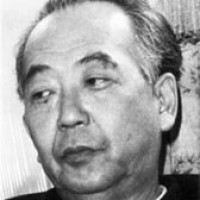Japanese director, active between the second half of the 1930s and the beginning of the 1980s. He started his career as a theatre actor during his studies at the Waseda University. In 1933, he gave it all up to join the film studio Shochiku where he started working as assistant to director Miki Naruse and others. Four years later he directed his first film for Toho film studio. He attracted international interest with his TV film based on the French novel La Symphonie pastorale by André Gide, titled
Den'en kôkyôgaku (1938). As a member of the Japanese Communist Party, he made a few propaganda films during World War II. After the War, he rebelled against Toho during workers' strike in 1948. As a consequence he got fired. He became a well known director in the 1950s with his independent films. He was making left-wing films, militant and socially aware, most famous one among them
Hakone fûunroku (1952). In 1960s, he started making more serious films based on literary works such as
Shiroi Kyotou (The Great White Tower, 1966),
Karei-naru ichizoku (The Family, 1974),
Kôtei no inai hachigatsu (1978) and war trilogies
Senso to ningen (Men and War), which consists of
Senso to ningen: Unmei no jokyoku (1970),
Senso to ningen II: Ai to kanashimino sanga (1971) and
Senso to ningen III: Kanketsuhen (1973).

